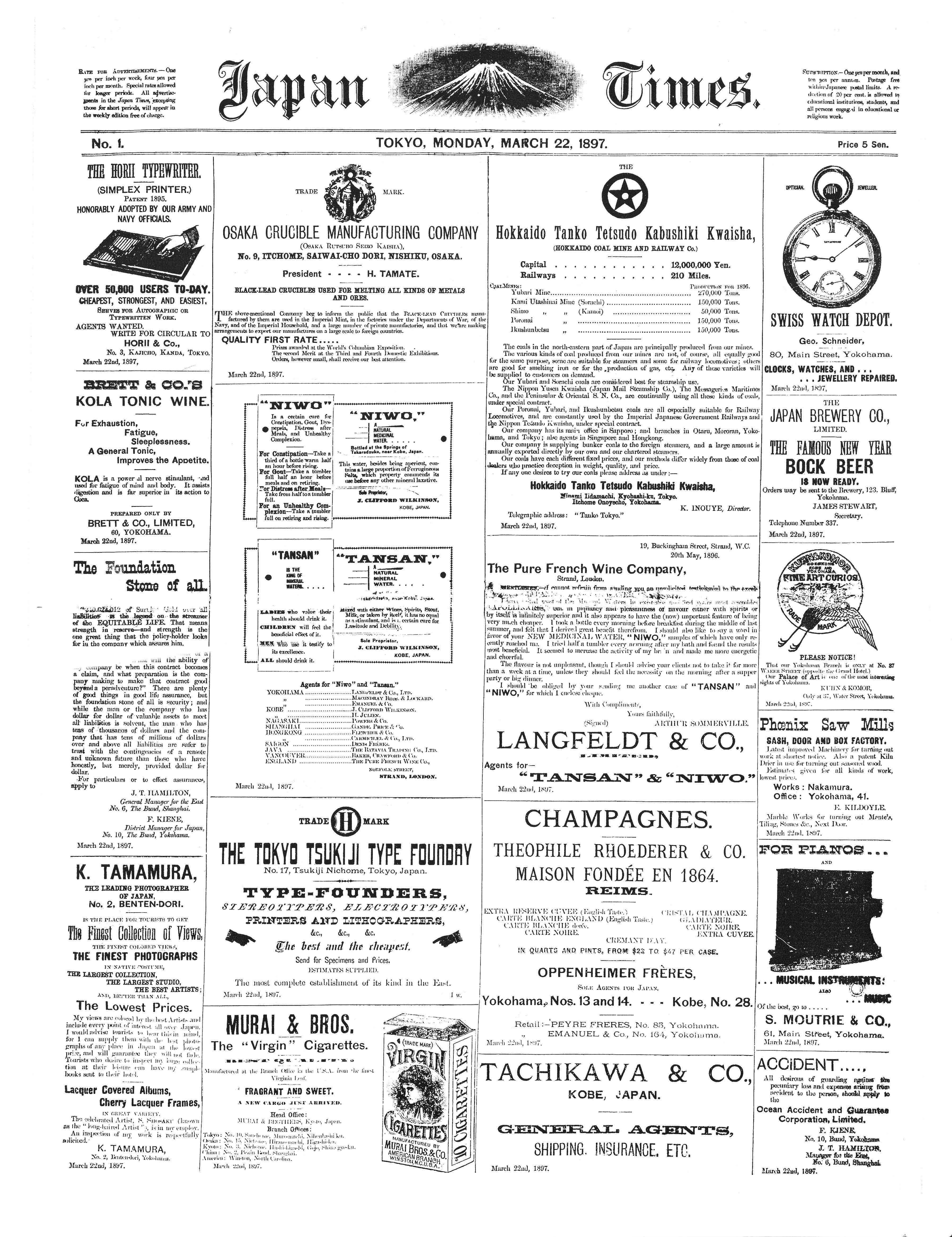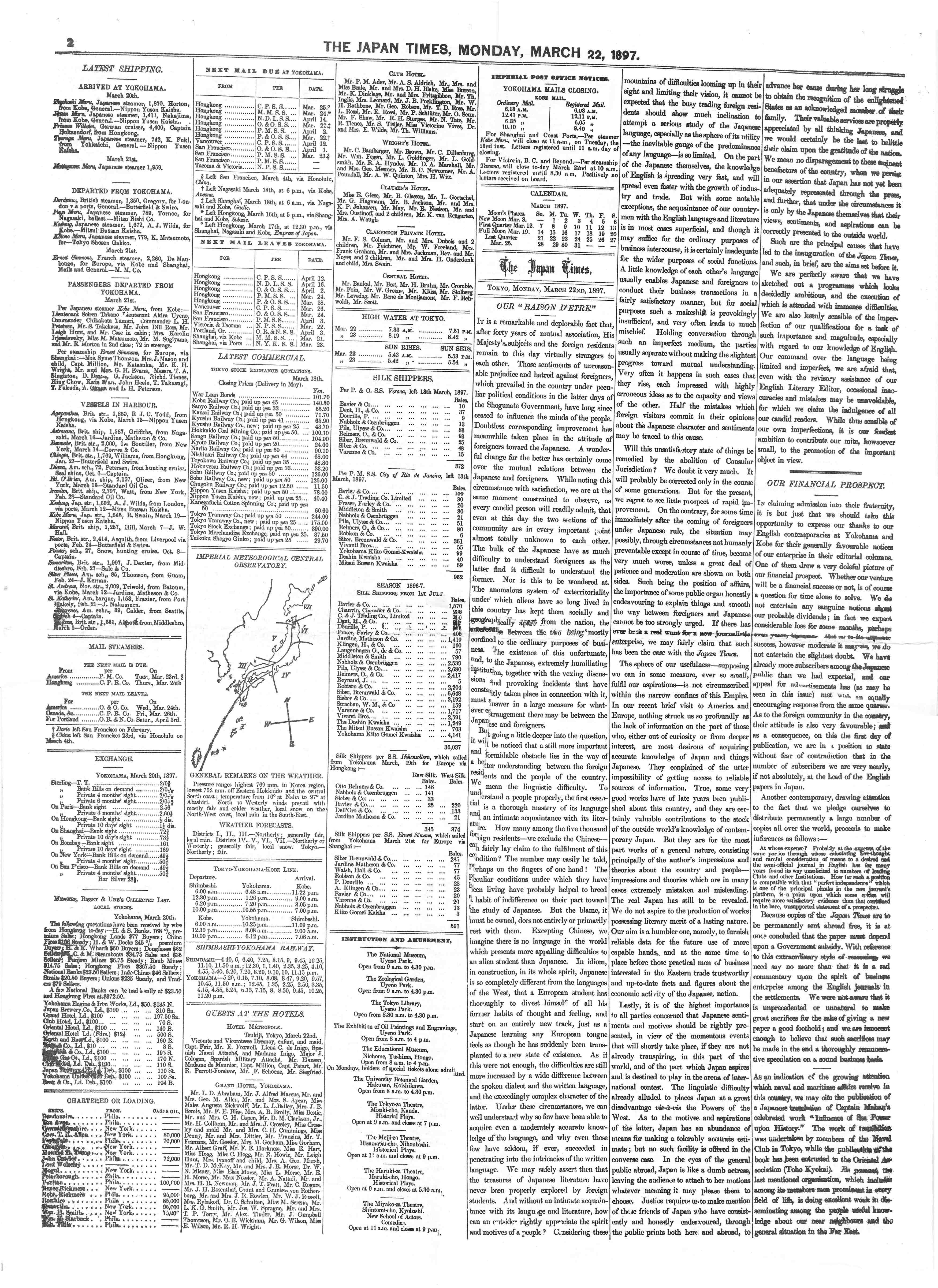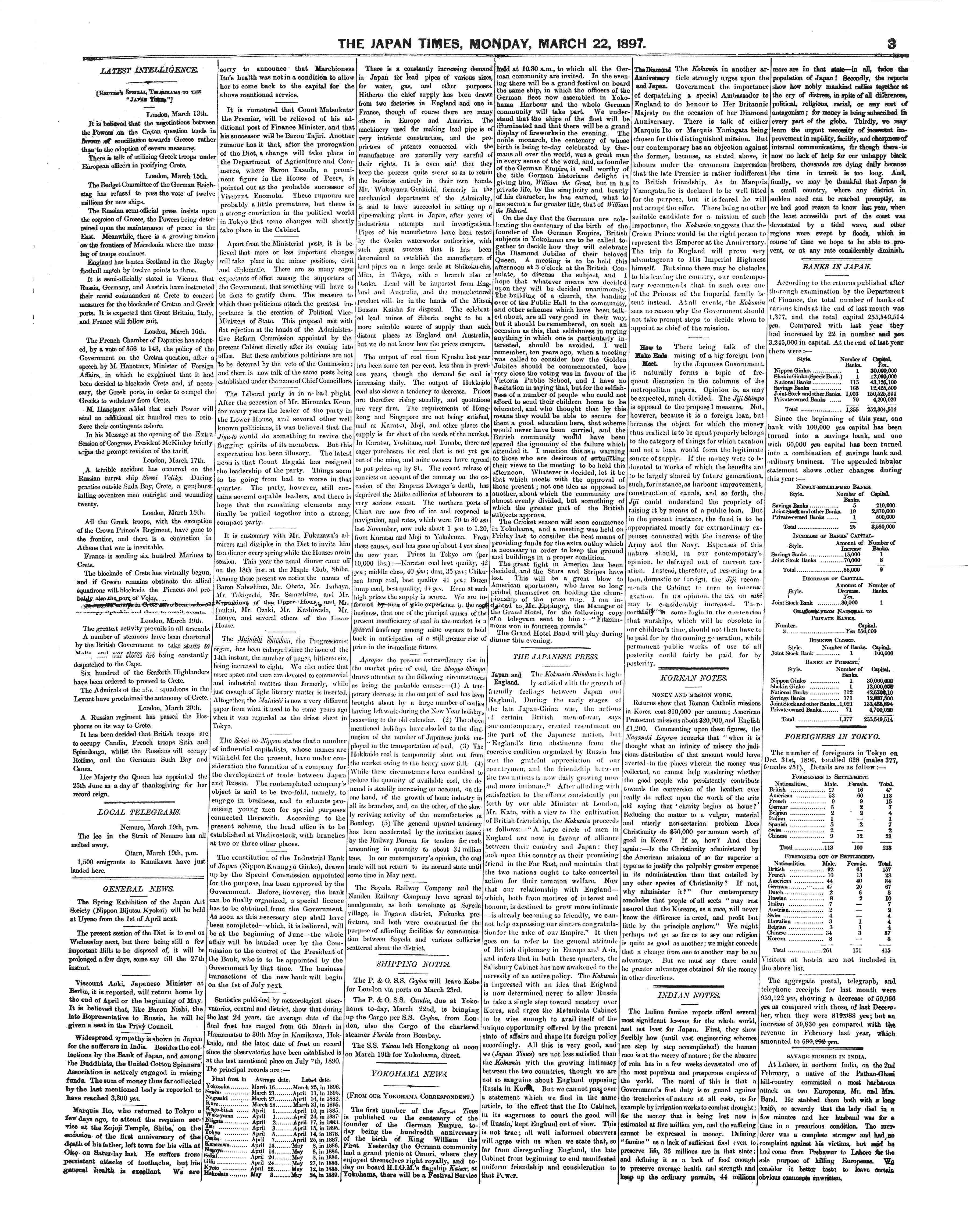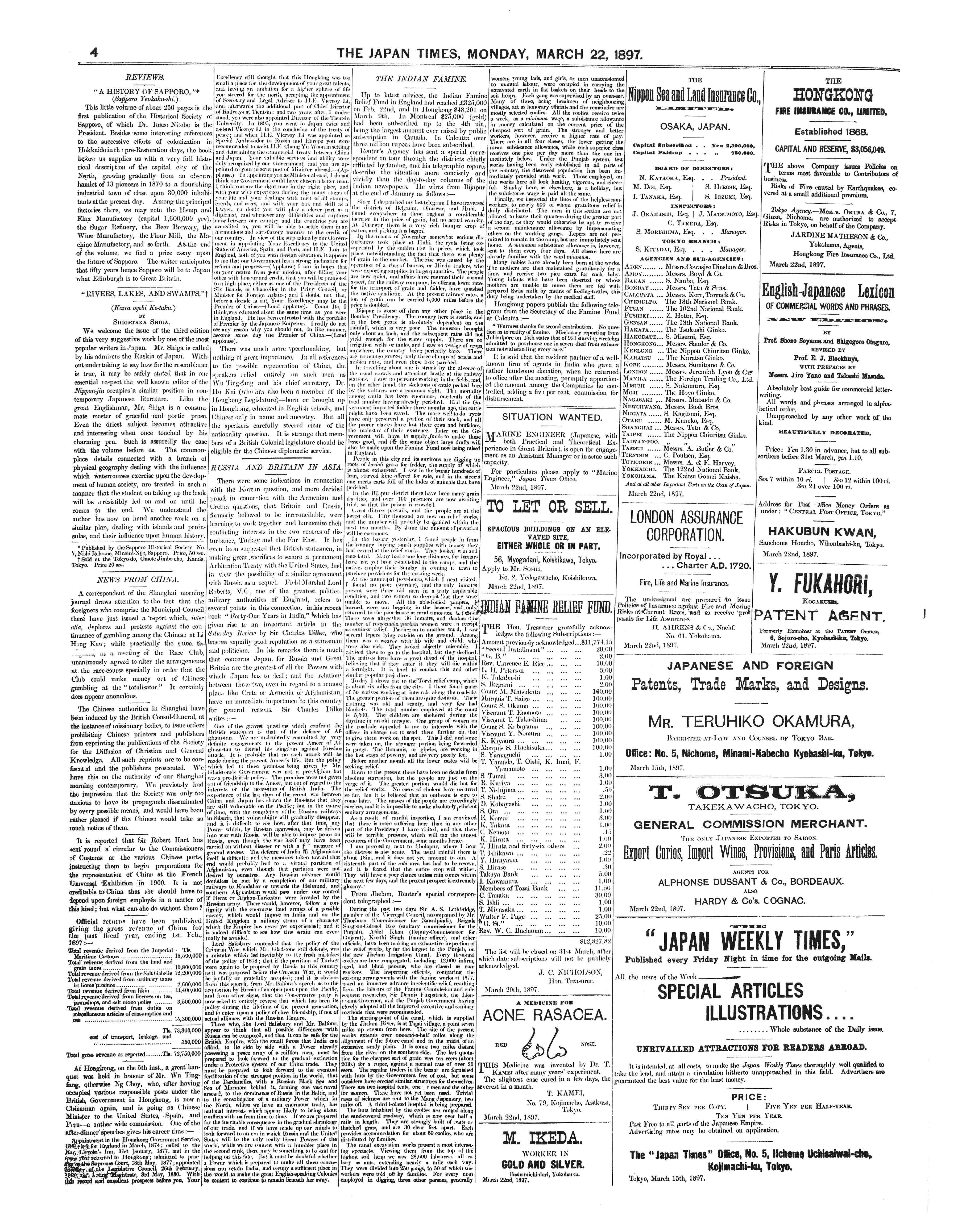ジャパンタイムズ創刊号紙面
ジャパンタイムズ創刊号紙面(明治30年)をじっくり読んでタイムトリップ。Pages
from the March 22, 1897, inaugural issue of The Japan Times, Japan's oldest
English-language newspaper.
メディア研究者およびJT史に関心をお持ちの方用のページです。画像資料集のため、ファイルが重いページになっています。This
webpage is intended for researchers of media history, and anyone interested in The
Japan Times.
■関連ページRelated pages: ジャパンタイムズ紹介 ジャパンタイムズ歴史 ジャパンタイムズのエイプリルフール報道
■ジャパンタイムズ創刊号紙面 明治30年3月22日 全6ページ
Inaugural issue of The Japan Times, March 22, 1897 ジャパンタイムズ創刊100周年レプリカより作成。現物はジャパンタイムズにも残っていません。マイクロフィッシュがジャパンタイムズとニュースパーク(日本新聞博物館)にあります。
拡大するにはクリックしてください。Click to enlarge.

JT創刊号第1面:
一部5銭、1ヶ月購読で壱円(1円)、1年間の購読料は拾円(10円)でした。
6ページ建て。
題字中央は富士山の絵です。
当時の英国タイムズ紙にならい、新聞はまず広告から始まりました。この第1面も、いろいろな会社の広告で埋まっています。
時代を反映し、金属会社のOsaka Crucible Manufacturing Company (大阪坩堝製造会社、現日本ルツボ株式会社に吸収合併か)、北海道炭鉱鉄道株式会社の広告がトップにあります。タイプライター(左上)、スイス時計(右上)、たばこ(中央下)、ピアノ(右下)、シャンペインの広告もあり、読んでいくとタイムスリップしたようでなかなか面白いです。各ページをクリックすると拡大します。

JT創刊号の第2面:
左半分は船舶の出入り、新橋・横浜の鉄道時刻表、天気予報など。
右半分は「当紙の存在意義」と題した創刊社説があります。創刊の理由は、治外法権撤廃などを願う日本人と外国人の相互理解であると述べています。
創刊社説の要約:
開国して40年、それなのに日本人と外国人居留民はいまだにstrangers to each otherである。その理由はlinguistic difficultyなので、
正確な報道を日本人の手で伝えたい。日本には中国人を除いて外国人5000人ほどがいるが、日本語がちゃんとできる人は五指に満たず。日本語は世界で一番難解(中国語を除く)なので、日本人の方から英語を使って国際理解を進めるのが現実的だ。現状では日本は、海外から見ると黙った女優(dumb
actress)に見える。日本の姿を正しく伝えんがため、本紙を創刊するものである。
創刊社説全文掲載
From The Japan Times, March 22, 1897 (the very first editorial)
OUR "RAISON D'ETRE."
It is a remarkable and deplorable fact that after forty years of mutual association, His Majesty's subjects and the foreign residents remain to this day virtually
strangers to each other.
Those sentiments of unreasonable prejudice and hatred against foreigners, which prevailed in the country under political conditions in the latter days of the Shogunate Government, have long since ceased to influence the minds of the people.
Doubtless corresponding improvement has meanwhile taken place in the attitude of foreigners toward the Japanese. A wonderful change for the better has certainly come over the mutual relations between the Japanese and foreigners.
While noting this circumstance with satisfaction, we are at the same moment constrained to observe, as every candid person will readily admit, that even at this day the two sections of the community are in every point almost totally unknown to each other.
The bulk of the Japanese have as much difficulty to understand foreigners as the latter find it difficult to understand the former. Nor is this to be wondered at. The anomalous system of
exterritoriality under which aliens have so long lived in this country has kept them socially and geographically apart from the nation, the intercourse between the two mostly confined to the ordinary purposes of business.
The existence of this unfortunate, and, to the Japanese, extremely humiliating institution, together with the vexing discussions and provoking incidents that have constantly taken place in connection with it, must answer in a large measure for whatever estrangement there may be between the Japanese and foreigners.
But going a little deeper into the question, it will be noticed that a still more important and formidable obstacle lies in the way of a better understanding between the foreign residents and the people of the country.
We mean the linguistic difficulty. To understand a people properly, the first essential is a thorough mastery of its language and an intimate acquaintance with its literature.
How many among the five thousand foreign residents - we exclude the Chinese - can fairly lay claim to the fulfillment of this condition? The number may be easily told, perhaps on
the fingers of one hand!
The peculiar conditions under which they have been living have probably helped to breed a habit of indifference on their part toward the study of Japanese. But the blame, it must be owned, does not entirely or primarily rest with them. Excepting Chinese, we imagine there is
no language in the world which presents more appalling difficulties to an alien student than Japanese.
In idiom, in construction, in its whole spirit, Japanese is so completely different from the languages of the West that a European student has thoroughly to divest himself of all his former
habits of thought and feeling and start on an entirely new tract, just as a Japanese learning any European tongue feels as though he has suddenly been transplanted to a new state of existence.
As if this were not enough, the difficulties are still more increased by a wide difference between the spoken dialect and the written language, and the exceedingly
complex character of the latter.
Under those circumstances, we can well understand why so few have been able to acquire even a moderately accurate knowledge of the language, and why even these few have seldom, if ever, succeeded in penetrating into the intricacies of the
written language. We may safely assert then that the treasures of Japanese literature have never been properly explored by foreign students.
And without an intimate acquaintance with its language and literature, how can an outsider rightly appreciate the spirit and motives of a people?
Considering these mountains of difficulties looming up in their sight and limiting their vision, it cannot be expected that the busy trading foreign residents should show much inclination to attempt a serious study of the Japanese language, especially as the sphere of its utility - the inevitable gauge of the predominance of any language - is so limited.
On the part of the Japanese themselves, the knowledge of English is spreading very fast and will spread even faster with the growth of industry and trade. But with some notable exceptions, the acquaintance of our countrymen with the English language and literature is in most cases superficial, and though it may suffice for the ordinary purposes of business intercourse, it is certainly inadequate for the wider purpose of social functions.
A little knowledge of each other's language usually enables Japanese and foreigners to conduct their business transactions in a fairly satisfactory manner, but for social purposes such a makeshift is provokingly insufficient, and very often leads to much mischief. Holding conversation through such an imperfect medium, the parties usually separate without making the slightest progress toward
mutual understanding.
Very often it happens in such cases that they rise, each impressed with highly erroneous ideas as to the capacity and views of each other. Half of the mistakes which foreign visitors commit in their opinions about the Japanese character and sentiments may be traced to this cause.
Will this unsatisfactory state of things be remedied by the abolition of Consular
jurisdiction?
We doubt it very much. It will probably be corrected only in the course of some generations.
But for the present, we regret to see little prospect of rapid improvement. On the contrary, for some time immediately after the coming of foreigners under Japanese rule, the situation may possibly, through circumstances not humanly preventable except in the course of time, become very much worse unless a great deal of patience and moderation are shown on both sides.
Such being the position of affairs, the importance of some public organ honestly endeavoring to explain things and smooth the way between foreigners and Japanese cannot be too strongly urged.
If there has ever been a real want for a new journalistic enterprise, we may fairly claim that such has been the case with The Japan Times.
The sphere of our usefulness - supposing we can in some measure, ever so small, fulfill our aspirations - is not circumscribed within the narrow confines of this
Empire.
In our recent brief visit to America and Europe, nothing struck us so profoundly as the lack of information on the part of those who, either out of curiosity or from deeper interest, are most desirous of acquiring accurate knowledge of Japan and things Japanese.
They complained of the utter impossibility of getting access to reliable sources of information. True, some very good works of late years have been published about this country and they are certainly valuable contributions to the stock of the outside world's knowledge of contemporary Japan.
But they are for the most part works of a general nature, consisting principally of the author's impressions and theories about the country and the people - impressions and theories which are in many cases extremely mistaken and misleading.
The real Japan has still to be revealed. We do not aspire to the production of works possessing literary merit of a lasting nature.
Our aim is a humble one, namely to furnish reliable data for the future use of more capable hands, and at the same time to place before those practical men of business interested in the Eastern trade trustworthy and up-to-date facts and figures about the economic activity of the Japanese nation.
Lastly, it is of the highest importance to all parties concerned that Japanese sentiments and motives should be rightly
presented, in view of the momentous events that will shortly take place, if they are not already transpiring in this part of the world, and of the part which Japan aspires and is destined to play in the arena of international contest.
The linguistic difficulty has already placed Japan at great disadvantage vis-a-vis the Powers of the
West.
As to the motives and aspirations of the latter, Japan has an abundance of means for making a tolerably accurate estimate; but no such facility is offered in the converse case.
In the eyes of the general public abroad, Japan is like a dumb actress leaving the audience to attach her motions whatever meaning it may please them to choose.
Justice requires us to make mention of those friends of Japan who have consistently and honestly endeavored through the public prints both here and abroad to advance her cause during her long struggle to obtain the recognition of the enlightened States as an acknowledged member of their family.
Their valuable services are properly appreciated by all thinking Japanese, and we would be the last to belittle their claim upon the gratitude of the nation.
We mean no disparagement to these eminent benefactors of the country, when we persist in our assertion that Japan has not yet been adequately represented through the press, and further, that under the circumstances it is
only by the Japanese themselves that their views, sentiments and aspirations can be correctly presented to the outside world.
Such are the principal causes that have led to the inauguration of The Japan Times and such, in brief, are the aims set before it.
We are perfectly aware that we have sketched out a program which looks decidedly ambitious, and the execution of which is attended with immense difficulties.
We are also keenly sensible of the imperfection of our qualifications for a task of such importance and magnitude, especially with regard to our knowledge of English.
Our command over the language being limited and imperfect, we are afraid that, even with the revisory assistance of our English Literary Editor, occasional inaccuracies and mistakes may be unavoidable, for which we claim the indulgence of all our candid readers.
While thus sensible of our own imperfections, it is our fondest ambition to contribute our mite, howsoever small, to the promotion of the important object in view.
*太文字は伊藤による。原文は全部で6段落しかないため、こまかく段落分けをしてあります。原段落は、改行を2行にして示してあります。

↑JT創刊号の第3面:
ニュース面です。まだ「見出し」(記事の一行要約)というものが発達していない時代です。各記事にはタイトルは付いていますが、「〜が〜した」という形の要約見出しは見当たりません。

JT創刊号の第5面:
三井・三菱財閥系などの広告が見られます。帝国ホテルなどの広告も。

JT創刊号の第6面(最終面):
日本郵船の広告が中央にあります。初代社長が日本郵船出身でした。
創刊以後のJTの代表的紙面は英治新聞史ページとJT Online Gallery で見れます
■ジャパンタイムズ 社説集 110年間の代表的社説集(対訳付き)も刊行
ジャパンタイムズの本
関連ページ JT紹介 JTエイプリルフール JT歴史 英字新聞史
■ニュース英語 関連ページ
■英字新聞の読み方入門
■見出しの読み方
■本 英文記事の読み方
■本 ニュース英語教本
■週刊ST 内容・購読ページ
■ジャパンタイムズWEEKLY
■ジャパンタイムズの内容
■NHK「ニュースで英会話」
■身長の2倍(記者特訓)
■金魚(記事の書き方)
■英字新聞 講演
■英字新聞 授業活用例
■サム記事
■英文記者になりたいページ
■エイプリルフールとジャパンタイムズ いたずら報道
■ジャパンタイムズの歴史
■ジャパンタイムズ創刊号紙面ページ 明治時代へタイムスリップ
■日本の英字新聞の歴史ページ
■紙面デザイン


